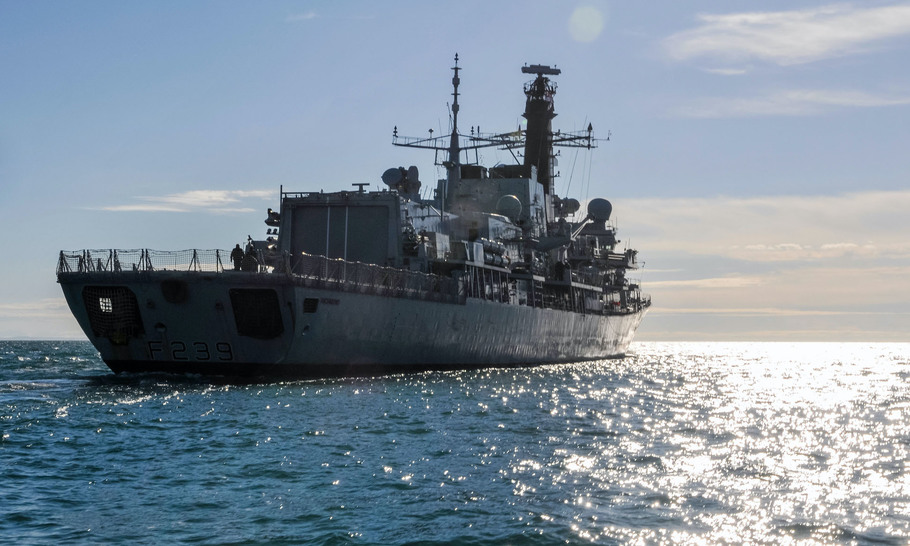The BBC drama ‘Vigil’ may be tosh, but bad things really can happen at sea

HMS Richmond (Alamy)
It says something about the British people’s relaxed relationship with the armed forces that we take their discreet presence in our national life for granted. News that 150 soldiers are being trained to drive tankers to ease the fuel shortage is not seen as a military intervention in politics, but as a normal part of their job.
It was the same during the pandemic, when the Army came to the rescue of the NHS and performed a variety of essential tasks. And the evacuation of thousands of civilians from Kabul showed the Royal Air Force and the Parachute Regiment at their bravest and best. Whenever the country needs them, the Services stand ready to help.
Yet the millions who have been watching Vigil, the BBC1 drama set on a nuclear submarine which finished last Sunday, might be wondering whether the Royal Navy is really as chaotic and undisciplined as it was depicted. Retired naval officers and ratings have been fuming online about innumerable details that the BBC supposedly got wrong. Some of these, such as the fact that Vanguard-class submarines are actually much more cramped than as shown in Vigil, are explicable by the requirements of filming. Others, including the assumptions of the storyline, are more dubious.
The point here is not to discuss the drama’s merits, but to note the fact that viewers are fascinated and most are astonished when presented with even a fanciful version of what the Navy does. For those who man our nuclear deterrent life on the ocean wave is, fortunately, rather less exciting than in Vigil. When the Rear-Admiral informs the civilians that “we have always been at war”, we know that this is an actor sending shivers down our spines. But as the much more realistic documentary Warship demonstrated a few years ago, life can be quite dramatic enough on board ship, even in peacetime. The phrase “worse things happen at sea” exists for a reason: the risk of accidents or misunderstandings leading to confrontation are not invented.
Earlier this week, the frigate HMS Richmond sailed through the Taiwan Strait — probably the most militarised and sensitive waterway in the world. She was shadowed by Chinese vessels as she passed through the strait that separates mainland China from Taiwan, while aircraft from both sides flew overhead. For the hours that the British warship spent sailing with China and Taiwan just over the horizon, en route from Japan to Vietnam, she was extremely vulnerable to attack. Everyone on board will have known that.
Richmond, the first Royal Navy warship to make this passage since 2008, was carrying out her mission to uphold freedom of navigation on the high seas. However, China not only claims the entire South China Sea as its territorial waters, but sovereignty over Taiwan. So the Beijing propaganda machine went into overdrive. The People’s Liberation Army East Theatre Command accused the British of a “speculative mentality”, adding: “This kind of behaviour harbours evil intentions and damaged peace and stability in the Taiwan Strait.” Global Times, the Chinese Communist Party’s mouthpiece, sought to make capital out of British domestic problems, such as fuel shortages and energy prices: “Doesn’t the UK feel frustrated and diffident when making such a provocation?” All this was for public consumption, but a British defence source was more reassuring about what took place at sea: “All the interactions have been safe and professional and engagement over the radio was cordial.”
The unspoken purpose of flying the White Ensign (or, more regularly, the Stars and Stripes) in this region of intense confrontation is to deter China from even contemplating an invasion of Taiwan. This is well understood on all sides and has caused the Chinese to retaliate by sending a naval squadron of their own into US waters off Alaska.
Tensions, indeed, are rising throughout the Far East. The Asian arms race is a consequence of China’s more aggressive stance, but it also raises the spectre of war. Aukus, the new alliance of Australia, the UK and the US, is designed to prevent old and new rivalries getting out of hand, but China has vowed to persist with its expansion. Japan’s new Prime Minister, Fumio Kishida, has promised a “courteous, open-minded” style of leadership, but he is very clear about the need to stand up to Chinese bullying, even if this means acquiring nuclear submarines, as Australia is already doing. Never to be forgotten is the joker in the pack, North Korea: a nuclear-armed rogue state, capable of instigating a conflagration at any moment.
Here in Britain, we should spare a thought for the men and women of HMS Richmond and those who serve all over the world, above and beneath the surface, to keep us safe. That passage through the Taiwan Strait, like the nearby route followed by HMS Queen Elizabeth and her task force a few weeks ago, was no pleasure cruise. There’s nothing theatrical about the Indo-Pacific theatre or the Royal Navy’s presence there. This is the reality of deterrence. Pace the Rear-Admiral in Vigil, we are certainly not at war. But we can never take peace for granted.
A Message from TheArticle
We are the only publication that’s committed to covering every angle. We have an important contribution to make, one that’s needed now more than ever, and we need your help to continue publishing throughout the pandemic. So please, make a donation.





